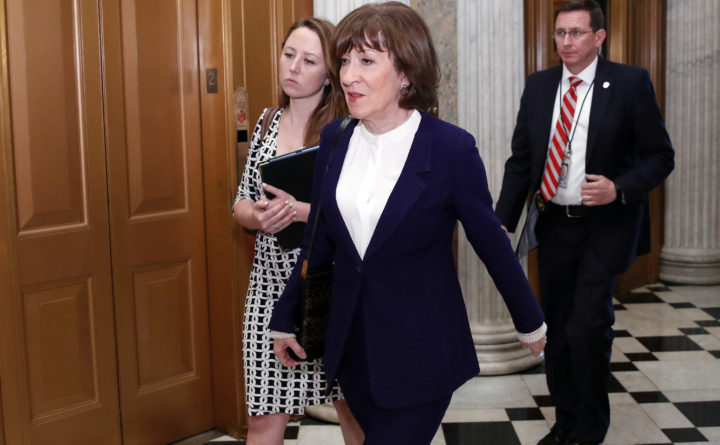
The Maine Republican Party is pressuring U.S. Sen. Susan Collins to approve President Donald Trump’s wall along the southern border, a request that’s at odds with the Republican Senator’s expressed desire to end the partial federal government shutdown first.
In a letter sent Wednesday, the party’s leadership and members of the State Committee urged “in the strongest terms possible” that Collins vote for wall funding.
While the letter is also addressed to Maine’s three other congressional representatives, an email from the Maine GOP’s deputy political director indicated that the letter was specifically intended for Collins, who has said Congress should reopen the federal government before negotiating border security.
[Subscribe to our free morning newsletter and get the latest headlines in your inbox]
Collins is one of four Republican senators who have staked that position. She told the Washington Post recently that previously negotiated bills to reopen the government should be passed right away.
“I see no reason why the bills that are ready to go and on which we’ve achieved an agreement should be held hostage to this debate over border security,” she added.
She reiterated that position during a floor speech on Wednesday.
“We need to come together in good faith, reopen government for a limited period of time, at least, and negotiate a package that will strengthen security on our borders,” she said. “And that is what I would urge the president, his administration, and my colleagues on both sides of the aisle to do.”
While the president promised that Mexico would pay for the wall, he is demanding Congress approve funding for it. Democrats, who now control the House of Representatives, have refused and passed a series of bills that would reopen the government first.
Collins has been criticized by liberal activists and commentators for not doing more to force the Republican-controlled Senate to pass bills to reopen the government. But the letter from the Maine Republican Party highlights the pressure she’s getting from conservatives aligned with Trump.
Several members of the GOP State Committee declined to sign the letter, including those closely aligned with Collins or those who work for constituent offices.
Collins was not available for an interview. Her office responded to inquiries about the letter by referencing her floor speech on Wednesday, which reiterated her position that the government should be reopened before negotiating border security.
GOP Chair Demi Kouzounas did not respond to an email or phone messages left at her office.
Eric Lusk, a member of the State Committee, said he didn’t sign the letter, but he did not object to the Committee members who did. Asked if the letter was designed to convince Collins to align with the Trump administration’s position, Lusk said, “probably.”
“There is no mention of getting federal employees back to work,” he said. “And I think in that regard, the letter is designed to say don’t forget about getting the issue (border security) dealt with. It’s a big deal. … They’re saying, ‘Don’t give away your trump cards sooner than you have to.’”
Collins’s position on the shutdown and Trump’s wall may not be satisfactory to some Maine GOP activists, but it appears more aligned with public opinion. A new NPR/ PBS/ Marist poll shows that 59 percent of respondents mostly blame Trump or congressional Republicans for the shutdown. A Pew Research Center survey found that 58 percent of respondents oppose substantially expanding the border wall, while 40 percent favor the proposal.
But the Pew poll also found that support for the border wall among Republicans is at an all-time high, increasing from 72 percent to 82 percent over the past year.
The letter to Collins captures the conservative sentiment. The signatories refer to themselves as “patriotic Americans deeply concerned about the safety of the American people” and the chance at building the wall as, “perhaps, a once-in-a-lifetime opportunity to truly secure our southern border and begin to fix our immigration system.”
The letter and criticism from Democrats are the latest example of Collins’s struggle to appease both constituencies as she heads into her anticipated 2020 reelection bid. She drew the ire of progressives activists in the fall for voting to confirm U.S. Supreme Court Judge Brett Kavanaugh, and in 2017, for approving a GOP tax overhaul that also affected the Affordable Care Act. Collins’s Kavanaugh vote fueled a fundraising effort to benefit whichever Democrat challenges her in 2020, an effort that’s exceeded $3.7 million so far.
Meanwhile, Collins is also under pressure from conservative activists that recently signaled the party’s plan to deal with devastating electoral losses in November.
It re-elected Demi Kouzounas as its chair, while adding Waterville Mayor Nick Isgro as vice-chair.
Isgro last year survived a recall effort prompted by an assortment of social media posts that borrowed or promoted alt-right rhetoric and conspiracy theories about immigrants and targeted Republicans resistant to Trump’s policies.
Isgro has also been sharply critical of Collins. In 2017 he criticized Collins’s call for “fanatical moderates” and touted a column by conservative columnist Mark Levin, who called Collins “disgraceful” and a “hack liberal who has used the GOP for decades to gain power.”
Isgro’s posts were reminiscent of criticisms from former Gov. Paul LePage, who declared in 2016 that the Republican party is “done” with Collins for opposing Trump’s candidacy.







